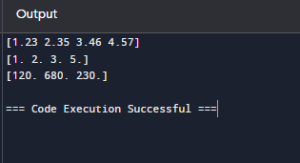Introduction:
`numpy.around()` is a function in the numPy library in Python that is used to round the values in an array to a specified number of decimal places. It helps in adjusting the precision of numerical data by rounding off the elements of the array to the nearest specified decimal point. This can be useful for simplifying data presentation, reducing computational complexity, or meeting specific formatting requirements.
numpy.around() in Python:
numpy.around() is a function in the numPy library in Python that rounds the values in an array to a specified number of decimal places. Here’s a detailed explanation:
Overview:
numpy.around() is used to round elements of an array to the nearest decimal point as specified by the user. This function is part of the NumPy library, which is a powerful tool for numerical computing in Python.
Syntax:
numpy.around(a, decimals=0, out=None)
Parameters:
- a: array_like
- Input array containing the elements to be rounded.
- decimals: int, optional (default is 0)
- The number of decimal places to round to. If
decimalsis negative, it specifies the number of positions to the left of the decimal point.
- The number of decimal places to round to. If
- out: ndarray, optional
- Alternative output array in which to place the result. It must have the same shape as the expected output.
Returns:
- rounded_array: ndarray
- An array of the same type as
a, containing the rounded values.
- An array of the same type as
Example usage:
import numpy as np # Example array arr = np.array([1.234, 2.345, 3.456, 4.567]) # Rounding to 2 decimal places rounded_arr = np.around(arr, decimals=2) print(rounded_arr) # Output: [1.23 2.35 3.46 4.57] # Rounding to the nearest integer rounded_arr = np.around(arr) print(rounded_arr) # Output: [1. 2. 3. 5.] # Rounding to the nearest ten (negative decimals) arr = np.array([123.45, 678.90, 234.56]) rounded_arr = np.around(arr, decimals=-1) print(rounded_arr) # Output: [120. 680. 230.]
Summary of example code:
- The code demonstrates how to use
numpy.around()to round array elements to various precisions: specified decimal places, nearest integer, and nearest ten. - The function is flexible, allowing both positive and negative values for the
decimalsparameter to control rounding precision.
output:

In summary, numpy.around() is a versatile function in NumPy that simplifies the task of rounding numbers in arrays, enhancing numerical data manipulation and presentation.